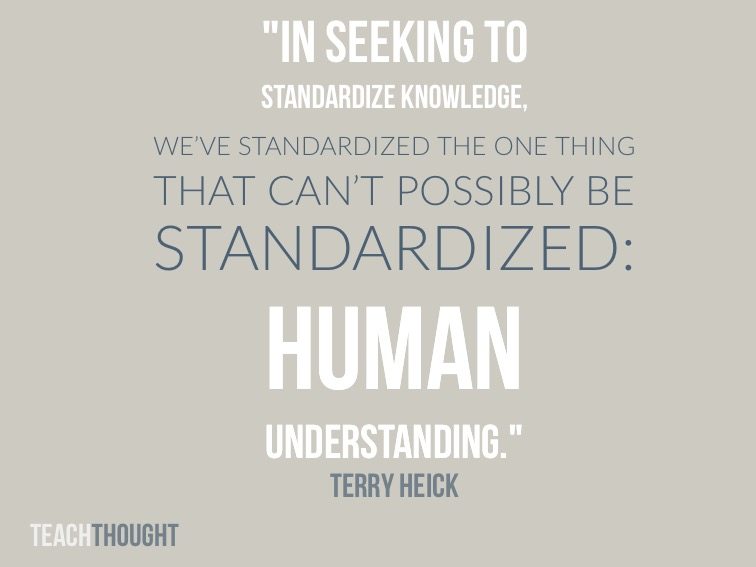
Learning Outcomes: The Cost Of Insisting What A Student Will Understand
by Terry Heick
Preface: The point of this article is not that Outcomes-Based Learning—and its desire to predict learning outcomes—is ‘bad.’ It’s frustrating when new ideas or approaches are focused on for their ‘problems’ rather than their potential.
(An irony? That’s how we approach teaching students, too.)
My hope in writing this (quick) post is that, as is the case when we analyze any new or existing idea in education, we can better understand it, then point out an opportunity for refinement and growth moving forward as we seek a system of ‘21st-century learning.’
The Problem With Learning Outcomes & Outcomes-Based Learning
There is a problem with predicting learning outcomes—at least insofar as it serves as the centerpiece for Outcomes-Based Learning and the parallel Data-Based Reform Movement. Well, it has several. First, consider a few of the underlying assumptions of this approach to education:
1. Outcomes-Based Learning assumes that learning outcomes can be accurately be predicted and assessed.
2. Outcomes-Based Learning assumes that all students should be learning the same thing.
3. Outcomes-Based Learning assumes that the things all students are being pushed to understand is worth understanding.
4. Outcomes-Based Learning assumes that all students can master all of the given outcomes (and only really works when they actually want to).
5. Outcomes-Based Learning requires learning not be ‘human-based,’ or ‘inquiry-based’ or ‘genius-based.’ It can be some of those things, but if it’s ‘based’ in all of them equally, it’s ‘based’ on none.
Focusing on uncovering a child’s ‘weaknesses’ so that they might ‘correct’ them is a curious approach to what should be a deeply human endeavor.
Schools often make children *feel* ‘stupid’ when instead, schools should make each child *feel* their genius.
— Terry Heick (@terryheick) February 12, 2018
The Infatuation With ‘Data’ & Outcomes-Based Learning In Education
TeachThought readers and community members have heard the discussion in and around predicting learning outcomes from many perspectives a thousand times:
The Real Problem With Multiple-Choice Questions
The Most Important Question Every Assessment Should Answer
10 Ways Data Can Sabotage Your Teaching
Why Assessments Don’t Really Measure Understanding
In a nutshell, in seeking to standardize knowledge we’ve standardized the one thing that can’t possibly be standardized at all: human understanding.
But when the New York Times says it, the reacher is broader and credibility stronger.

The Misguided Drive To Measure Learning Outcomes
In ‘The Misguided Drive To Measure ‘Learning Outcomes,’ contributing writer Molly Worthen, an assistant professor of history at the University of North Carolina, Chapel Hill, recently explored some of the problems of outcomes-based learning from a post-K-12 perspective.
All this assessing requires a lot of labor, time and cash. Yet even its proponents have struggled to produce much evidence — beyond occasional anecdotes — that it improves student learning.
“All this assessing requires a lot of labor, time and cash. Yet even its proponents have struggled to produce much evidence — beyond occasional anecdotes — that it improves student learning. “I think assessment practices are ripe for re-examining,” said David Eubanks, assistant vice president for assessment and institutional effectiveness at Furman University in Greenville, S.C., who has worked in assessment for years and now speaks out about its problems. “It has forced academic departments to use data that’s not very good,” he added. “And the process of getting this data that’s not very good can be very painful.”
The push to quantify undergraduate learning is about a century old, but the movement really took off in the 1980s. The assessment boom coincided — not, I think, by accident — with the decision of state legislatures all over the country to reduce spending on public universities and other social services. That divestment continued, moving more of the cost of higher education onto students. (These students are often graduates of underfunded high schools that can’t prepare them for college in the first place.) It was politically convenient to hold universities accountable for all this, rather than to scrutinize neoliberal austerity measures.”
There isn’t a lot new that you haven’t heard before, though the quotes from various experts (tongue in cheek: we were not contacted for comment, strangely enough) and focus on the role of universities in the outcomes-based reform movement make it worth a read.
You can find the full article here.

